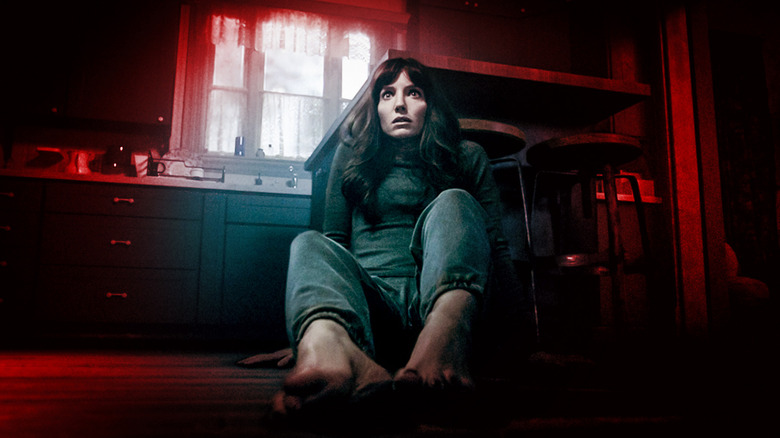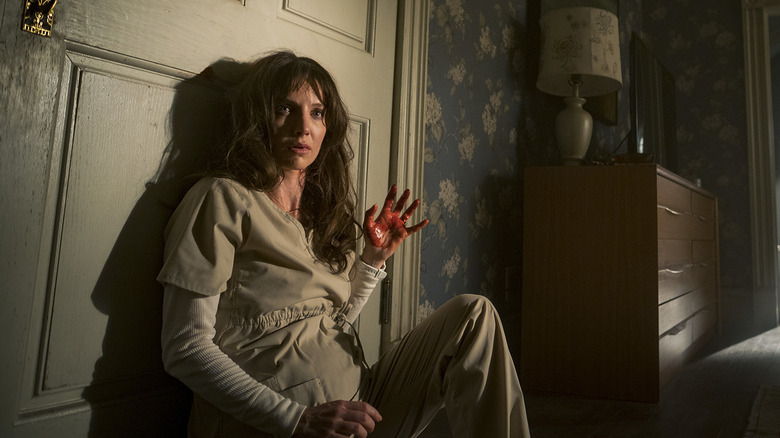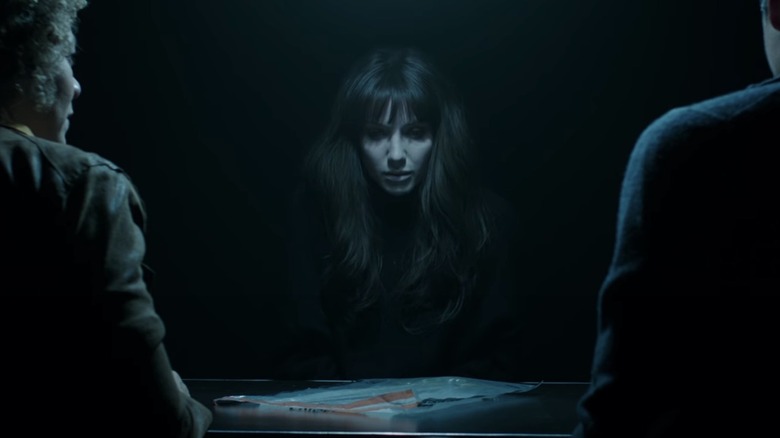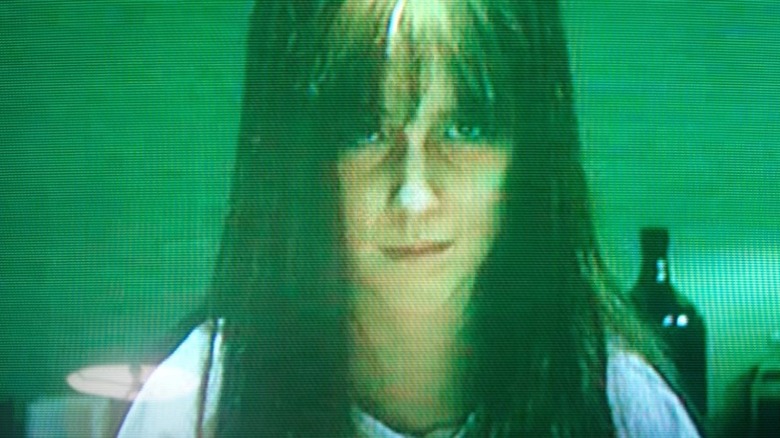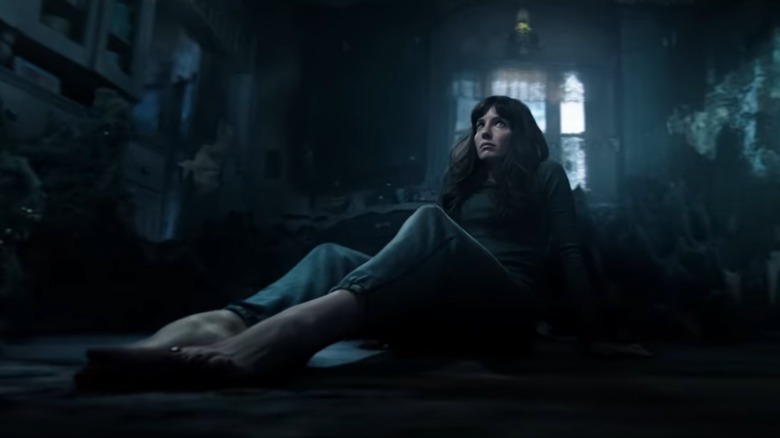The Spoiler-Filled Story Behind Malignant's Craziest Moments [Interview]
"Malignant" is the craziest mainstream release in a long time. Years, maybe. It's the kind of bonkers filmmaking usually reserved for niche genre film festival entries and long-forgotten trash masterpieces from the '80s. To see it playing in theaters, and at the top of the HBO Max streaming service, is a perverse delight. Director James Wan, on a break between directing "Aquaman" and its sequel, decided to make the kind of blank check horror movie others can only fantasize about. We probably won't see its like again for a very long time.
So, who cooked up the core ideas of "Malignant," a film that has drawn comparisons to '80s schlock, '90s slashers, early-'00s Dark Castle releases, Dario Argento, Giallo films, and a number of other obvious and not-so-obvious horror cuts? That would be Ingrid Bisu, who has a story credit on the film, served as an executive producer, and even plays a supporting role onscreen. She's also married to James Wan, and the two of them put their horror-loving heads together to crack this gnarly, twisted, and truly wild story.
/Film recently caught up with Bisu over Zoom to talk all about "Malignant," and how it came to be. It involves strange medical obsessions, a love for Giallo aesthetics, and a search for a contortionist who could pull off the wild movements and stunts seen in the movie.
And we immediately get into spoilers, so consider that your warning. This interview assumes you've seen the movie. And you should see it. It's wild.
"Nobody stopped us, so we just ran for the door!"
I was told this movie was inspired by a nightmare you had.
No, it actually wasn't inspired by a nightmare. I've seen that narrative going around. I don't know why. It's just something I've always been fascinated with, all these medical anomalies and the idea of twins. That's where it came from. Then I started doing my research and I realized it gets a lot darker. I felt very inspired, came up with a pitch, brought it to my husband, [director James Wan], and that's where it started flourishing. It wasn't from a dream, as cool as that sounds. Sorry if I'm disappointing you. I do have crazy dreams, just not this one.
When you brought this idea to him, what was the first part of this pitch? How far evolved was it when you talked about the initial idea?
The initial idea was like a conjoined twin, but one of them is evil and is hiding inside the body. I felt like the head would be the greatest place to hide because that's the neural central point. We started going from there. I'm like, "I think this creature, this twin, is evil, and it's manipulating the person that's inhabiting the body because he doesn't have his own body. He has to share this body." That's how it started. The story had many avenues that we tested. This was the one that we stuck with, but we really explored a lot.
Was this before or after "Aquaman"?
After. After he finished editing "Aquaman," after Aquaman came out.
I think it's amazing that after "Aquaman" makes a billion dollars, you two were able to go to Warner Bros. and say, hey, we just made you a billion dollars, can we make this?
Actually, it wasn't like that at all, because we're an independently financed film. We're with Starlight Media. We didn't need anybody's approval. [Starlight] financed the movie. They were all-in from the very first second. They trust James completely. They trust me. We were our own bosses.
"Malignant" feels like one of the wildest mainstream releases I've seen in a while, maybe years. It's fun to know that you did it on your own. You had the power and the resources to not have to worry about people overseeing that.
Nobody stopped us, so we just ran for the door! [laughs]
"All of that is real, and it's done backwards."
I want to know the timeline of events, how you two built this idea out. At one point you have to say, okay, he's got to be wearing a coat. Then, he's got to emerge from the back of the head. Then, he's got to run around backwards and do parkour.
We spent months developing this, months in our home with our doggies in his office going back and forth. We were challenging each other. For example, we knew that something had to trigger his response. It was the head smashing that makes [Gabriel] start to come out. This is interesting, because I'm reading articles and I don't see anybody paying attention to the nuances of this film because it's so balls to the wall. And I get it. It's insane. Who the f**k has time to pay attention to these details?
He starts coming out slowly. Then it's a little bit, and then you see a sliver, and then you see a little bit more of his face where he's hiding. He's not ready to fully come out. That's what happens at the police precinct.
We really had to figure out how the final reveal was going to happen at the end, but we knew there had to be a trigger. That was our trigger. Then we started thinking, "Okay, so when he's committing all these crimes, how does it work?" Can we do it backwards? We were literally in his office just going, "Wait, how do you grab something like this? How do you hold the knife?" It was really difficult. It's like... I want to go to Mars. I want to go to Venus. I have no idea how I'm going to get there! We didn't know how is this going to work? Are we going to find a contortionist that actually can do that?
We did. We found it in Marina Mazepa. She's absolutely incredible. She blew us away the first time we met her, because it just wouldn't have been possible without somebody that actually has this body capacity. There's not a lot of CGI when it comes to her movement, to Gabriel's movements. That's real. The fight scenes, the stabbings — all of that is real, and it's done backwards.
When did you realize your killer's main weapon was going to be a modified trophy?
We knew he had to have an amazing weapon. We were like, "What would he use?" It had to be something original. It had to be something crazy. That's where we both came in. My pitch was that it's a trophy that has to do with [the first victim's] performance in surgery. Then James started designing it, the actual design, the drawing with the handles. It's from... With the leaves, from Greek mythology. The guy who flies. Hermes?
Hermes. Yeah.
He has the wings, if I'm not mistaken. He's also part of healing. It all ties together to represent something medical. That was a very kind of...
You're perverting all the medical imagery into a killer weapon.
Exactly. He's holding these two handles between his fingers and then you have the blade coming out right at the top. Basically, he bludgeons her with the bottom until it breaks off. Then he takes the weapon and he sharpens it. For him, it's all part of his vengeance. It's all part of the plan. It's so beautifully coming together.
"I kept coming up with f**ked up sh*t."
You've mentioned [horror subgenre Giallo] before as an influence. I feel like every few months, the horror community argues about Giallo and what Giallo means. What is your personal definition of Giallo and how is "Malignant" a Giallo film?
This is a very important. Giallo is very beloved. I don't want to say anything that might offend the community. For me, it's in the eyes, it's in the colors, it's in the reaction. I'm thinking Dario Argento here particularly. The tension, the suspense, and there's moments of campiness. There's the eyes and the screams and everything that we were inspired by to put it in this movie. The leather. There's just so much. I can't comprise it into one thing. There's so much of the Giallo genre that inspired us.
So you consider Giallo to be more of a mood than anything else?
Exactly. Yeah, yeah. Mood, but also the costumes. The leather gloves and all that, for us, that was inspired from the Giallo style. The big eyes, silent screams. It's a lot. Obviously that's all James' vision at the end of the day.
One of my favorite things about the movie is that Gabriel's super-powers, his ability to control machines, is never explained. Did you ever script an explanation, or did you decide no, we don't need that crap?
No. How do you explain a superhero? Why is Flash the way he is? We know about the kryptonite with Superman, but he is a supernatural creature. That's just how he is born. It's a medical anomaly. He's able to control this somehow. I think instead of necessarily exploring that, the doctors were more concerned about saving Madison's life. He was siphoning her nutrients. He was killing her and making her do horrible things. It was like, there's not really much time for this! We got to just save Madison at this point.
The entire police station sequence is just wild, starting with the prison breakout scene and then the big massacre. It reminded me of "Maniac Cop 2," or "The Terminator." It becomes Hong Kong-style action movie for a bit. Can you talk about how this sequence came about?
A lot of the motivation was this idea that this one body suffered so much abuse. It took so much that it has had enough. I love violent movies. I love gore. I love seeing blood. I love Tarantino. The whole vision was just for Gabriel to unleash himself at his full extent, his entire power. What can you really do? For example, the second doctor, you don't see how he was killed. You don't really know how vicious and powerful Gabriel can be. This was the moment to really show that and end it once and for all. When he's really unleashing, it's over for everybody else. He's unstoppable. They don't have guns in that jail cell. They have nothing.
The women who were abusing Madison and Gabriel were done for. We wanted this to get as crazy as possible, as intense and violent as possible. It feels so amazing to do a scene like that, because you really feel like you can unleash a lot of things you can't do yourself, at least for me. It's a fantasy. You just... Against all the bullies and all the bad things that happen, you just let it out. At one point, I thought "What if you ripped someone's full arm off and then stab another person with it through the guts?" But there was no more time. We had so much going on. I kept coming up with f**ked up sh*t.
"I'm very, very grateful that the people that this was made for love it."
Even with all the non-stop carnage, "Malignant" has one thing in common with other James Wan movies — it's about family. His work seems genuinely interested in how families survive and endure through pain and terror. Can you comment on that?
He's very close with his family. He has a love for the nucleus that is family. I think he really puts a lot of that in his movies, "Malignant" included. He called this the horror version of "Frozen," and I was like, "Oh my God. I didn't even think about that."
Not all movies have to be about a love story. It's just to make you feel all these emotions of wanting to protect somebody that's part of your family. Sydney does everything she can [for her sister], even though they had been separated. When they reunite under these unfortunate circumstances at the hospital, it really is like they make up for lost time. James has a lot of that sensibility, and I don't think a lot of people realize it.
Every serious horror fan I know has fallen for "Malignant," but the response has been divisive. But I feel like the common complaint doesn't hold water. The movie is exactly aware of what it is, and what it's doing.
I was looking at the reviews and I'm not going to lie. It's literally been a trip. On one side you have, "Oh my God, I f**king love this movie. It's the greatest thing." But there's also, "What a piece of sh*t. Cancer to our society." It's literally like that. I knew this wasn't going to be everybody's cup of tea. We both knew that. Really, truly, I am glad it's so polarizing. Either you f**king love it or you f**king hate it and there's no in-between.
It was made for a certain group of people and those people love it. This is for the lovers of gore, slasher, '80s, '90s, VHS tapes, Giallo, body horror. This is for them. It's not for everybody. I really wanted this to just be something different. I'm very, very grateful that the people that this was made for love it. They enjoy it. They understand it.
"Malignant" is in theaters now, and streaming on HBO Max.
